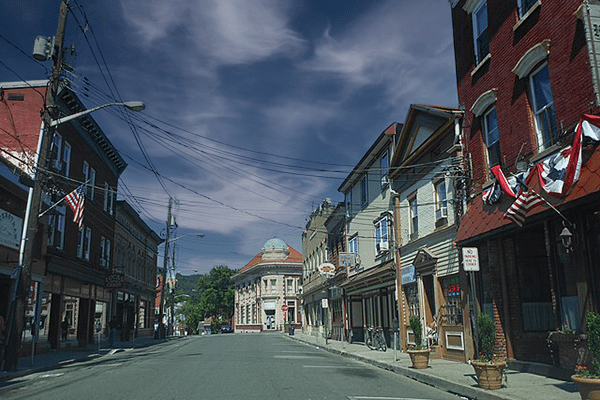|
RCBJ-Audible (Listen For Free)
|
Fear Of Immigrant Roundups Impacting Local Businesses, Families
By Tina Traster
At a bakery in the Village of Haverstraw, the lines are shorter and the cake orders are smaller.
“People are scared,” said a bakery owner who preferred not to use his name. “They are staying low, not going out, not really moving around too much, just in case.”
Fear spread by the Trump administration’s appetite to round up immigrants through ICE (U.S. Immigration & Customs Enforcement) raids, especially Hispanic people, is impacting daily life and economic stability in the Village of Haverstraw, and other enclaves with targeted populations.
For the baker, demand for smaller cakes has been greater than larger ones because “people aren’t throwing big birthday parties. They’re doing something at the house. So instead of ordering a custom cake for 40 people, now it’s a smaller cake for five people. Having celebrations draws attention. People don’t want to make too much noise.”
There is general agreement that the streets of the Village have been eerily quiet and empty since Trump began his second term. From coast to coast, Trump’s high-profile campaign to arrest and deport millions of undocumented immigrants has subdued and rattled neighborhoods, casting a pall of fear and distrust. Mostly, the administration has been publicizing raids in big cities and deportation flights to Latin America. Trump has directed ICE to make more than 1,800 arrests daily.
One of the first raids targeted a fish wholesaler in Newark, New Jersey, and another high-profile raid took place at the Bronx Terminal Market in early February. It is unclear how many raids have taken place in Rockland County, but sources say agents have done sweeps in Spring Valley and Suffern, two of the county’s Hispanic enclaves.
“ICE has put a chilling effect on the Village,” said Mayor Michael Kohut. “Especially in the beginning, people were concerned. We saw fewer people in the streets, we didn’t see day laborers at the delis for a while.”
Kohut said he has not heard of a specific raid in the Village, where more than 60 percent of the population is Hispanic. But he added, “my community center is concerned that ICE will come there. However, they won’t let ICE on the property unless they have a valid warrant.”
New York is one of 11 states known as “sanctuary states” that have policies that limit cooperation with federal immigration enforcement. The Trump administration has directed the federal government to “employ all lawful means to ensure the faithful execution of the immigration laws of the United States against all inadmissible and removable aliens.” However, there have already been several high-profile cases of the administration seizing and attempting to deport people, even green card holders, without due process.
For the administration to achieve such aggressive goals, it must effectively work within communities and deputize officials – even if this flies in the face of New York’s laws.
New York legislators are fighting back with the pending “New York For All Act” to keep ICE from using local resources without a judge’s order. Legislators Dem. State Sen. Andrew Gounardes and Assembly member Karines Reyes have introduced companion bills that would push for clearer rules of engagement to protect immigrant communities. The bills would stop law enforcement, probation staff, state employees, and municipal officials from using public resources for immigration enforcement. It requires ICE to supply a warrant from a judge or court order to get help on immigration issues from local police, peace officers, or school resource officers. The bill says officials should not let ICE agents enter schools or shelters without a court order from a judge.
Meanwhile fear and uneasiness impacts daily life in the Village.
“Children and families are absolutely terrified about what’s going to happen, even if they have legal standing,” said Marion Breland, director of Youth and Family Services for the Village of Haverstraw. “Children are afraid to go to school. They’re afraid they’ll come home, and their parents will be disappeared. Some say that it’s already happening.”
Recently, a Village employee’s family member, who had a minor criminal conviction, was picked up and moved to a detention center in California. “He has not been seen since,” Breland said. “Nobody has had contact with him.”
Breland said the chilling effects of ICE have been notable at the weekly food pantry.
“People are notably missing,” Breland said. “They’re afraid to stand outside in a crowd. They’re afraid to be seen. They’re afraid that just because they look Hispanic, they will be approached.”
Milagros Cobb, director of religious education at St. Peter/ St Mary’s of the Assumption said many congregants have stopped attending church.
“They are afraid their parents will be picked up by ICE,” said Cobb, who runs the religious program for children. “They are also afraid to go to school. We are hearing from teachers that the children are not going to school because they’re afraid their parents will be picked up and tortured, and they will have to live with someone else.”
When asked whether the North Rockland Central School District has seen any decline in student attendance due to ICE fears, the district spokesman said, “the district will not comment on attendance.” But added, the district “has added no fewer than 12 school counselors during the past 18 months to support the social-emotional needs of all students – regardless of immigration status. “
Cobb said the church has experienced an explosion of people at the indoor food pantry.
“We used to see 200 families; now it’s closer to 400 because people are not working or they’re afraid to go out and shop.”
Cobb said the church is doing what it can to soothe fears and provide sanctuary. They have not allowed ICE agents onto their premises.
“I know two people in the Village have been taken,” Cobb said. “People talk, everyone is being careful. I know we need to reform immigration, but this is not the way to do it. This is the problem.”
Sofia Todisco, owner of Flours Pasta & Bakery, says she’s felt a palpable mood shift in the Village. Others echo similar observations.
“I’m not sure if it is the crackdown on immigrants or fear around the economy, but there is a real lack of activity in the town, a lack of foot traffic,” said Todisco. “The hospitality industry has been hard hit. Restaurants are empty. People are nervous. I don’t think it started with the ICE raids, but I think fear of the unknown and economic distress has had an impact. Locals are having a hard time.”
Another business owner said, “I can go to three restaurants on a Friday and Saturday and they’re almost empty. “People are scared. They’re staying home. They don’t want to go shopping or to the restaurants.” Another observer said business appears to be slacking in hair salons.”
Many say fearful neighbors continue to work because “they have to pay the rent, the bills,” but they’re keeping a low profile. One source said ICE agents are trawling local Home Depots and other home improvement centers where day laborers and contractors typically congregate.
Freddy Villreal runs a dance studio in the Village, Let’s Dance. He is feeling the brunt of cancellations.
“Business has fallen off,” Villareal said. “People are cancelling parties; they’re not coming to practice for Quinceanera. People who hired me three months ago call and say they need to cancel. I’ve lost nearly $10,000 in the past few months for three events that were cancelled.”
Villareal says he has no choice but to keep going.
“I’ve leased my space for five years – and I’ve got two more years to go,” he said. “I’ve spent $55,000 to fix it up. I can’t break my lease. It’s complicated. I’m hoping things will change.”
Attorney Andrea Panjwani recently gave a presentation at the Haverstraw community center on immigrant’s and agency’s rights.
















